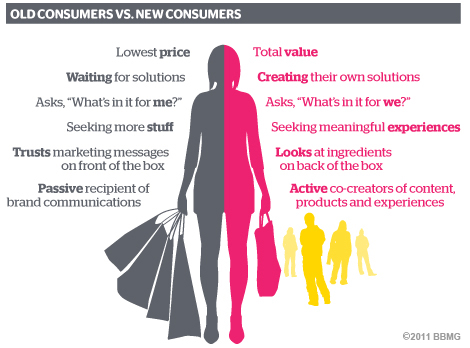 Brand innovation firm BBMG today releases a comprehensive study, Unleashed: How New Consumers Will Revolutionize Brands and Scale Sustainability. The multimedia booklet (available for download here) draws on three years of research and introduces brands to New Consumers: shoppers who unite pragmatism and purpose with an unmatched level of brand participation. This increasingly important groupcurrently 30 percent of the U.S. populationis poised to help sustainable brands enter the mainstream, while forcing large brands to accelerate their pathways to sustainability. Their influence will be so great that BBMG identifies 2011 as the dawn of a new economy with unlimited opportunities for innovative, values-driven, authentic brands.
Brand innovation firm BBMG today releases a comprehensive study, Unleashed: How New Consumers Will Revolutionize Brands and Scale Sustainability. The multimedia booklet (available for download here) draws on three years of research and introduces brands to New Consumers: shoppers who unite pragmatism and purpose with an unmatched level of brand participation. This increasingly important groupcurrently 30 percent of the U.S. populationis poised to help sustainable brands enter the mainstream, while forcing large brands to accelerate their pathways to sustainability. Their influence will be so great that BBMG identifies 2011 as the dawn of a new economy with unlimited opportunities for innovative, values-driven, authentic brands.
For brands to take sustainability to scale, they can no longer rely on the dark green consumer. Instead, they need to engage New Consumers, who are just as concerned about the environment but also realistic about factors like price, performance, convenience, health and safety, said Raphael Bemporad, BBMGs Chief Strategy Officer. Our study is the first to take a deep look at the implications of the New Consumer on the marketplace, identifying their core values and purchasing priorities, and how brands can engage them to drive innovation and positive social impact.
Who: Meet the New Consumer
BBMGs previous research focused on Conscious Consumers: individuals whose deep-rooted environmental and social values drive purchasing decisions. But major economic and societal changes have forced all consumers to make compromises. Meanwhile, mainstream shoppers have become more concerned with environmental values, more educated and outspoken about personal values like health and safety, and more protective of their time and money. These shifts led to BBMGs current examination of New Consumers: shoppers who are classified as values aspirationals because they are as interested in sustainability as their dark-green brethren, but who are also practical purchasers because theyre forced to make practical trade-offs every day.
More than 70 million adults across the United States are considered New Consumers; and are less defined by demographics than by shared values. Early adopters and box turners increasingly concerned with products impact on the planet and its people, these savvy shoppers are twice as likely to try new things, share their opinions online and reward (or punish) brands based on corporate practices. Even during the recession, 25 percent are willing to pay more for sustainable alternatives. At the same time, theyre re-evaluating purchasing priorities, often opting for DIY projects and choosing to enjoy experiences instead of new commodities.
How: Private Social Network as Research Tool
BBMGs comprehensive ethnographic study was informed by more than 2,650 conversations in The Collective, the firms proprietary consumer community. Unlike an online panel, The Collective is a private social network, the first to broker dedicated, real-time conversations between New Consumers, sustainable brands and related organizations. BBMG screens each member, and invites them to participate through a variety of activities, including digital diaries, brand innovation challenges, home audits and shopping-basket exercises.
The result is a co-created, interactive report that includes videos and photo journals from representative New Consumers, insights from some of the worlds most powerful and forward-thinking brands and lessons from companies that failed to successfully engage New Consumers.
Why Theyre Important
The role of the consumer has never been more importantnot as a passive marketing target, but as a partner and brand advocate. New Consumers, in particular, see themselves as active participants who are helping shape brands practices. They turn to the Internet, social networks, NGO certifications and third-party trustmarks to verify purchases. Their belief systems are driving several trends, including the explosion of the access economy and continued interest in YDI (you-do-it) goods and DIY projects. And many are moving from gateway purchases such as organic, local foods to major purchases like energy-saving appliances, fair-trade apparel and socially and environmentally responsible travel.
New Consumers are skepticalless than four percent turn to company advertising to verify product claimsbut once they find an authentically good product, they become fiercely loyal; and that loyalty will be instrumental in bringing green brands to the mainstream. Theyre constantly on the hunt for innovative brands that will resolve their buyers remorse and deliver what BBMG terms the Triple Value Proposition: uniting practical benefits like cost savings, durability and style; social and environmental benefits; and tribal benefits that connect them to a community of like-minded, like-hearted individuals.
What They Need
New Consumers seek genuine, ongoing conversations with brands that let them share their ideals, passions and creativity. And as they step into the empowering role of co-creator, they expect companies to involve them in shaping how their brands live in the world.
BBMGs study makes the case for embedding a deeper sense of social and environmental purpose into every business decision; and, for wiring consumers values and ideas into each business model. Finally, the study highlights five key insights that will help brands reach, engage and unleash the power of the New Consumer:
1. Deliver Total Value: New Consumers Want It All
2. Paint a Bigger Picture: New Consumers Are Asking Whats In It For We?
3. Be Their Champion: New Consumers Are Taking Control
4. Make More Out of Less: New Consumers Want Simplicity, Meaningful Experiences
5. Invite Them In: Participation Is the New Consumption
Consumers are now driving business, instead of the other way around, which means the disciplines of branding and innovation are converging like never before, said Bemporad. Tomorrows most successful brands will recognize this, and will establish very clear pathways that allow them to constantly listen, engage and drive innovationand, ultimately, change the world.



